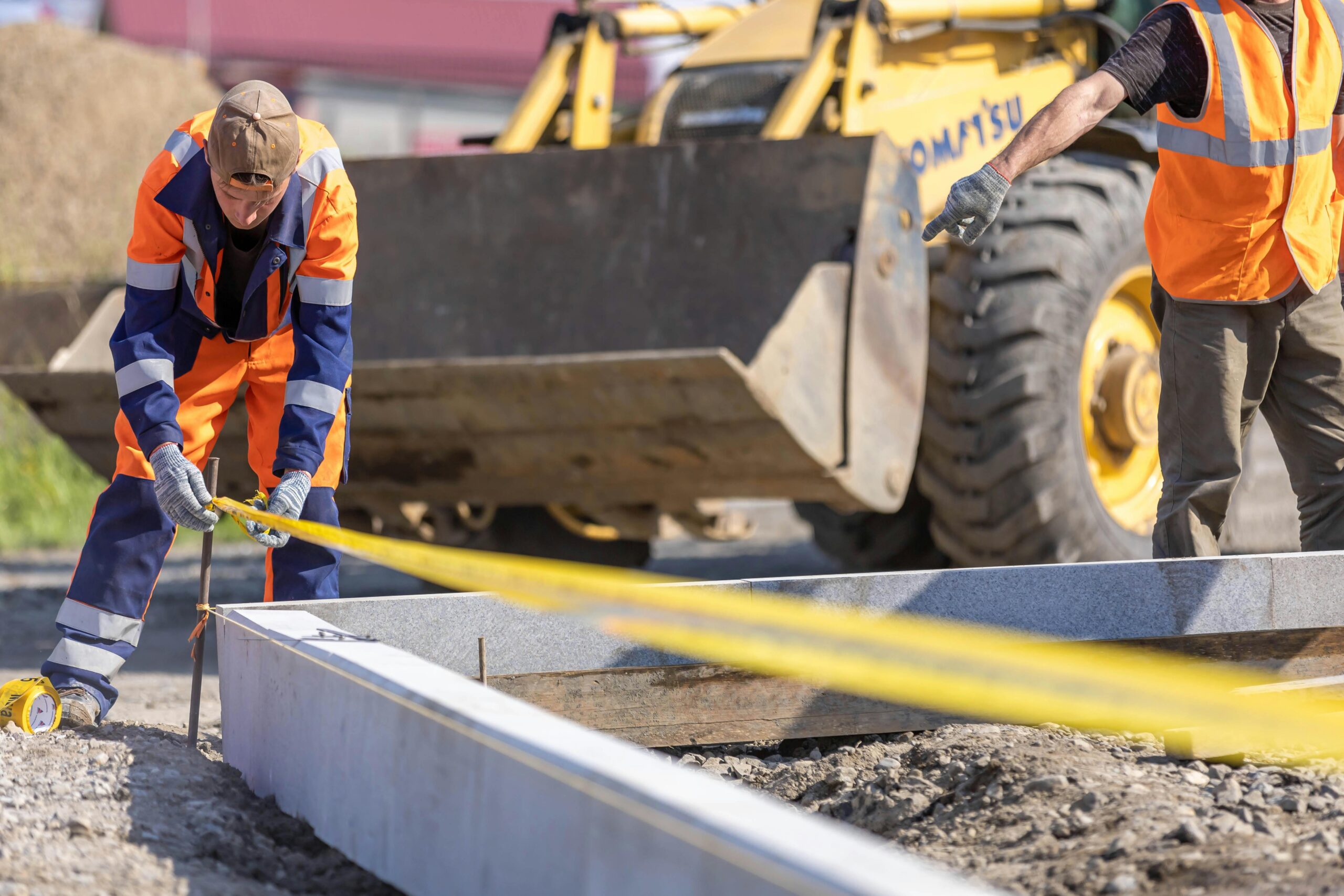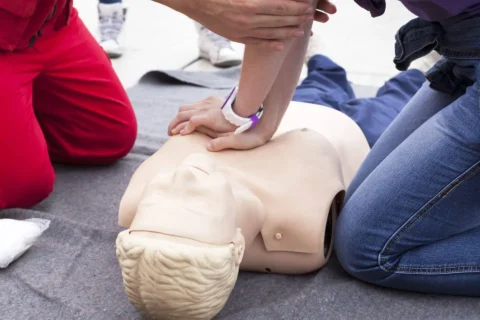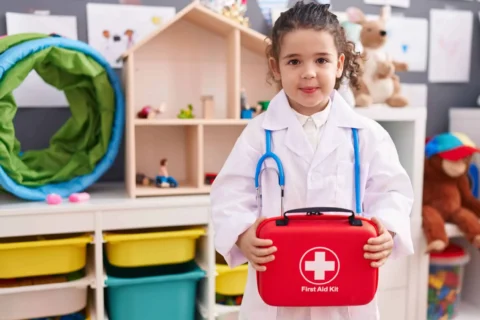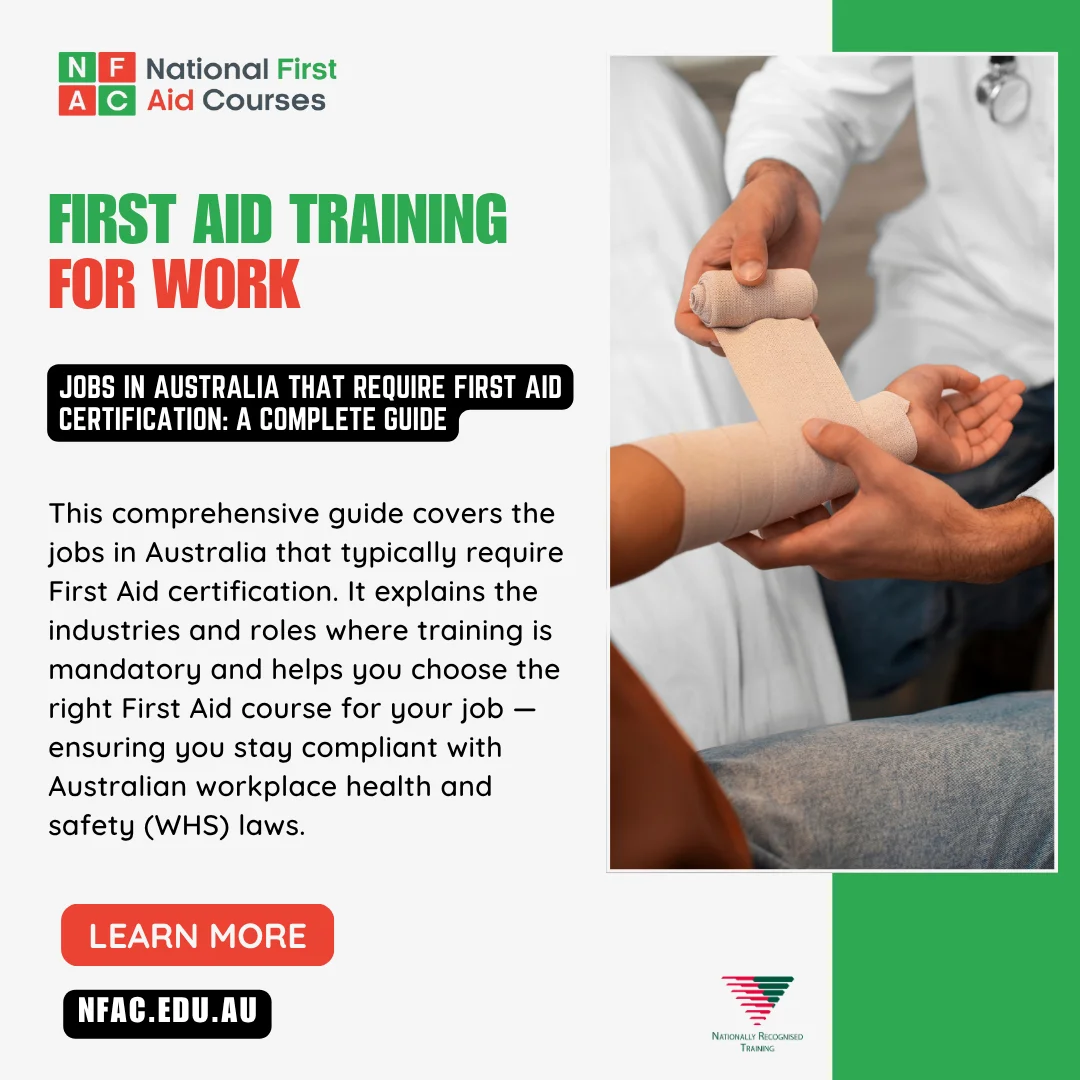
Key Takeaways for Australian Workers
- Industry-Specific Requirements: Many roles across construction, healthcare, childcare, mining, hospitality, and more require valid First Aid certification.
- Mandatory for Compliance: Employers must meet WHS obligations by ensuring an adequate number of trained first aiders are available at all times.
- Courses That Apply: The three nationally recognised options are HLTAID011 Provide First Aid, HLTAID009 CPR, and HLTAID012 Childcare First Aid.
- Regular Refreshers Required: CPR must be updated annually, while Provide First Aid and Childcare First Aid require renewal every 3 years.
- Career Advantage: Holding a current First Aid certificate is often the difference between being job-ready and missing out on employment.
- Fast & Convenient Training: NFAC offers same-day certificates, face-to-face courses, and flexible options across NSW and QLD.
Do You Need a First Aid Certificate for Your Job?
Healthcare & Aged Care

Required First Aid Training
-
Provide First Aid (HLTAID011) – the standard requirement across most roles.
-
CPR (HLTAID009) – usually refreshed annually, often mandated by employers.
-
Childcare First Aid (HLTAID012) – required for staff working with children (paediatrics, early learning, paediatric wards).
Overview
In healthcare and aged care, first aid isn’t optional — it’s embedded in workplace compliance and professional responsibility.
Whether in hospitals, GP clinics, aged care facilities, or community care, staff must be prepared to respond to emergencies ranging from cardiac arrest to choking or falls.
Regulatory bodies, including the Aged Care Quality Standards and Australian Health Practitioner Regulation Agency (AHPRA), expect employees to maintain current certification.
Roles Commonly Requiring Certification
-
Registered Nurses and Enrolled Nurses
-
Aged Care Workers / Personal Care Assistants
-
Disability Support Workers
-
Paramedic Assistants / Patient Transport Officers
-
Allied Health Professionals (physiotherapists, occupational therapists, speech pathologists)
-
Medical Receptionists and Practice Managers
-
GP and Specialist Medical Staff
-
Childcare and Early Childhood Educators (where care overlaps with health services)
-
Home Care and Community Support Workers
Why First Aid Matters
| Role | Typical Risks in Workplace | Notes |
|---|---|---|
| Nurses & Care Staff | Cardiac arrest, falls, choking, seizures | CPR refresher required annually by most facilities |
| Aged Care & Disability Support | Falls, medication errors, mobility-related emergencies | Must maintain Provide First Aid at all times |
| Allied Health Professionals | Patient collapse during therapy, allergic reactions | Employers typically mandate CPR in addition to First Aid |
| Medical Receptionists | First point of response before clinical staff intervene | Often required to hold Provide First Aid + CPR |
| Childcare & Paediatric Health | Choking, anaphylaxis, asthma | Must complete Childcare First Aid (HLTAID012) |
⚠️ Note: These are the most common roles requiring certification, but requirements may extend further depending on the employer’s policies and regulatory environment.
Education & Childcare

Mining & Resources
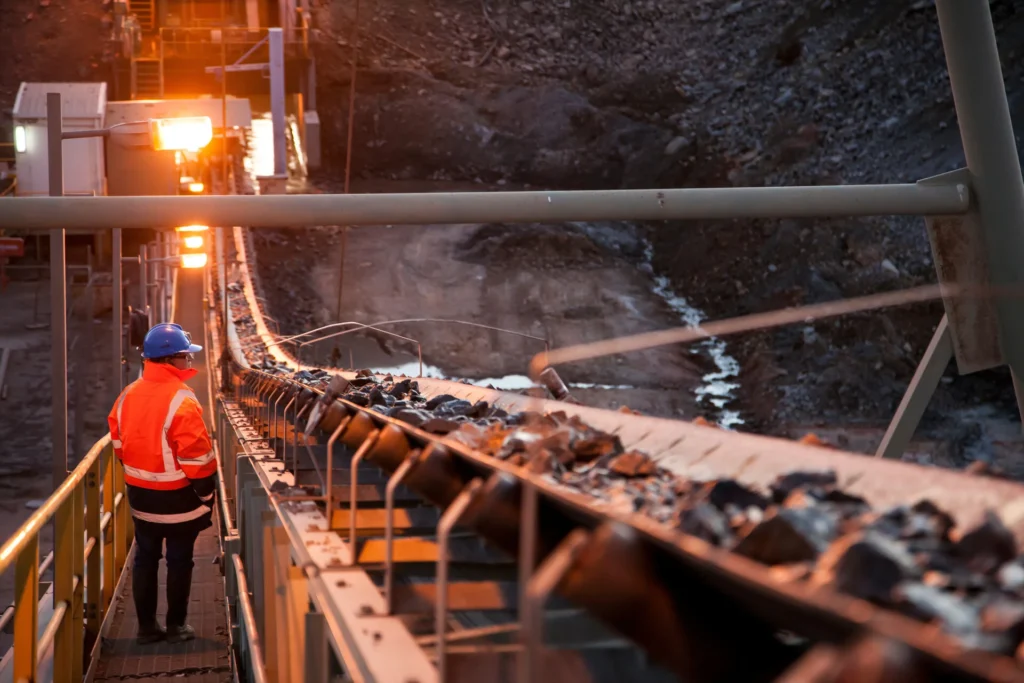
Required First Aid Training
-
Provide First Aid (HLTAID011) – required across most operational roles.
-
CPR (HLTAID009) – refreshed annually, often enforced as a site access requirement.
-
Childcare First Aid (HLTAID012) – generally not required unless working in remote family support programs linked to mining towns.
Overview
Mining, oil, and gas are classified as high-risk industries under WHS laws.
Remote and hazardous conditions mean workers must be prepared to respond to serious incidents such as crush injuries, falls from height, electrical accidents, or chemical exposure.
Regulations often require a set ratio of trained first aiders on every shift, and many employers make certification a condition of employment or site entry.
Roles Commonly Requiring Certification
-
Underground and Open-Cut Miners
-
Drillers, Blasters, and Shotfirers
-
Machinery and Plant Operators
-
Mining Engineers and Geologists (site-based)
-
Safety Officers and OHS Coordinators
-
Site Supervisors and Team Leaders
-
FIFO/DIDO Workers (all roles generally required)
-
Maintenance Trades (electricians, mechanics, fitters working on mine sites)
-
Truck and Haulage Operators
-
Emergency Response Team Members
Why First Aid Matters
| Role | Typical Risks in Workplace | Notes |
|---|---|---|
| Underground & Open-Cut Miners | Cave-ins, crush injuries, falls, confined space incidents | Provide First Aid mandatory; CPR refresher yearly |
| Drillers & Blasters | Explosives handling, hearing damage, trauma injuries | Must maintain Provide First Aid to meet WHS obligations |
| Plant & Machinery Operators | Rollovers, entrapment, electrical hazards | Employers often require CPR as part of site induction |
| FIFO/DIDO Workers | Remote location medical emergencies | Provide First Aid usually non-negotiable for employment |
| Safety Officers | Responsible for site compliance and emergency coordination | Higher expectations; often required to refresh CPR annually |
⚠️ Note: Most mining companies apply stricter requirements than the legal minimum, ensuring all site-based employees maintain current Provide First Aid and CPR certifications
Hospitality & Retail

Transport & Logistics

Office & Corporate

Sports, Fitness & Recreation

Government & Public Services

Remote & Isolated Work

FAQ's About First Aid Training

Do all employees need first aid training, or just some?
Not every employee is legally required to be trained, but every workplace must have an adequate number of trained first aiders. The ratio depends on workplace size, level of risk, and whether staff work in remote or high-risk environments. Many employers go further and make training compulsory for all staff.
How often does first aid training need to be updated?
-
Provide First Aid (HLTAID011): Refresh every 3 years
-
CPR (HLTAID009): Refresh annually — strongly recommended and often enforced by employers
-
Childcare First Aid (HLTAID012): Refresh every 3 years (with CPR refreshed annually)
-
What happens if my certification expires?
If your certificate lapses, you are no longer recognised as a qualified first aider. Employers may remove you from duty as a first aid officer until refresher training is complete. In industries like healthcare, childcare, and aged care, expired certification can also put professional registration or employment at risk.
Who decides what level of first aid training is required in a workplace?
Requirements come from a mix of:
-
WHS legislation (Safe Work Australia guidelines)
-
Industry regulations (e.g., Education and Care Services National Regulations)
-
Employer policy (some exceed minimum standards)
-
Can first aid training count towards professional development or compliance points?
Yes. In education, healthcare, childcare, fitness, and other sectors, accredited first aid courses contribute to CPD (Continuing Professional Development) or link directly to licensing and registration requirements.
If my workplace already has a first aid officer, do I still need training?
It depends on your role. Some staff — like teachers, security officers, aged care workers, and sports coaches — require their own certification regardless of whether a designated first aid officer is present. For others, only a set number of trained staff per site, floor, or shift may be required.
What’s the difference between Provide First Aid, CPR, and Childcare First Aid?
-
Provide First Aid (HLTAID011): The standard workplace course, covering the most common emergencies.
-
CPR (HLTAID009): Focused only on cardiopulmonary resuscitation; must be updated yearly.
-
Childcare First Aid (HLTAID012): Includes asthma, anaphylaxis, and paediatric emergencies — required for childcare and education roles.
-
Can employers be fined if staff don’t hold valid first aid certificates?
Yes. Employers who fail to meet WHS requirements can face penalties and legal liability. More importantly, if an incident occurs and no trained first aiders are available, it places workers at serious risk.
Get Government-Approved First Aid Training at a Location Near You!
Want to step into your volunteer role with confidence and the skills to make a real difference?
Join thousands of Australians who trust National First Aid Courses — a leading provider of nationally recognised, accredited training that’s designed for real-world community settings.
As a Registered Training Organisation (RTO 41072), we specialise in practical, hands-on first aid courses that prepare you to respond in emergencies — whether you’re helping at events, visiting aged care homes, or supporting vulnerable people.
With convenient face-to-face training across NSW, VIC and QLD, same-day certificates, and competitive pricing, getting certified has never been easier.
Enrol in a First Aid or CPR course with National First Aid Courses today — and be the calm, capable presence your community can count on.

